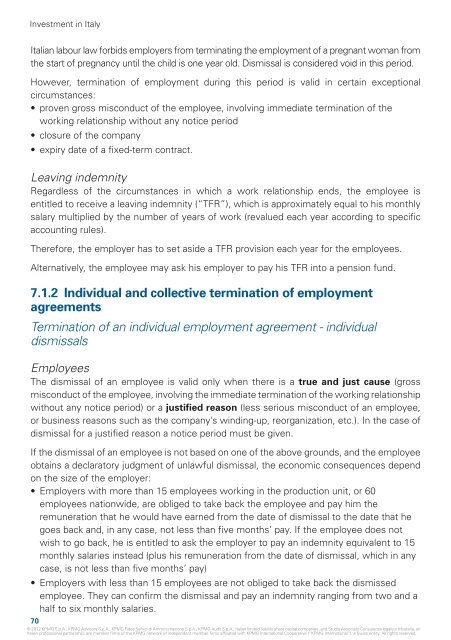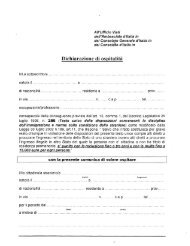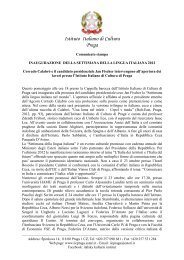Investment in Italy
Investment in Italy
Investment in Italy
- No tags were found...
You also want an ePaper? Increase the reach of your titles
YUMPU automatically turns print PDFs into web optimized ePapers that Google loves.
<strong>Investment</strong> <strong>in</strong> <strong>Italy</strong>Italian labour law forbids employers from term<strong>in</strong>at<strong>in</strong>g the employment of a pregnant woman fromthe start of pregnancy until the child is one year old. Dismissal is considered void <strong>in</strong> this period.However, term<strong>in</strong>ation of employment dur<strong>in</strong>g this period is valid <strong>in</strong> certa<strong>in</strong> exceptionalcircumstances:• proven gross misconduct of the employee, <strong>in</strong>volv<strong>in</strong>g immediate term<strong>in</strong>ation of thework<strong>in</strong>g relationship without any notice period• closure of the company• expiry date of a fixed-term contract.Leav<strong>in</strong>g <strong>in</strong>demnityRegardless of the circumstances <strong>in</strong> which a work relationship ends, the employee isentitled to receive a leav<strong>in</strong>g <strong>in</strong>demnity (“TFR”), which is approximately equal to his monthlysalary multiplied by the number of years of work (revalued each year accord<strong>in</strong>g to specificaccount<strong>in</strong>g rules).Therefore, the employer has to set aside a TFR provision each year for the employees.Alternatively, the employee may ask his employer to pay his TFR <strong>in</strong>to a pension fund.7.1.2 Individual and collective term<strong>in</strong>ation of employmentagreementsTerm<strong>in</strong>ation of an <strong>in</strong>dividual employment agreement - <strong>in</strong>dividualdismissalsEmployeesThe dismissal of an employee is valid only when there is a true and just cause (grossmisconduct of the employee, <strong>in</strong>volv<strong>in</strong>g the immediate term<strong>in</strong>ation of the work<strong>in</strong>g relationshipwithout any notice period) or a justified reason (less serious misconduct of an employee,or bus<strong>in</strong>ess reasons such as the company’s w<strong>in</strong>d<strong>in</strong>g-up, reorganization, etc.). In the case ofdismissal for a justified reason a notice period must be given.If the dismissal of an employee is not based on one of the above grounds, and the employeeobta<strong>in</strong>s a declaratory judgment of unlawful dismissal, the economic consequences dependon the size of the employer:• Employers with more than 15 employees work<strong>in</strong>g <strong>in</strong> the production unit, or 60employees nationwide, are obliged to take back the employee and pay him theremuneration that he would have earned from the date of dismissal to the date that hegoes back and, <strong>in</strong> any case, not less than five months’ pay. If the employee does notwish to go back, he is entitled to ask the employer to pay an <strong>in</strong>demnity equivalent to 15monthly salaries <strong>in</strong>stead (plus his remuneration from the date of dismissal, which <strong>in</strong> anycase, is not less than five months’ pay)• Employers with less than 15 employees are not obliged to take back the dismissedemployee. They can confirm the dismissal and pay an <strong>in</strong>demnity rang<strong>in</strong>g from two and ahalf to six monthly salaries.70© 2012 KPMG S.p.A., KPMG Advisory S.p.A., KPMG Fides Servizi di Amm<strong>in</strong>istrazione S.p.A., KPMG Audit S.p.A., Italian limited liability share capital companies, and Studio Associato Consulenza legale e tributaria, anItalian professional partnership, are member firms of the KPMG network of <strong>in</strong>dependent member firms affiliated with KPMG International Cooperative (“KPMG International”), a Swiss entity. All rights reserved.
















